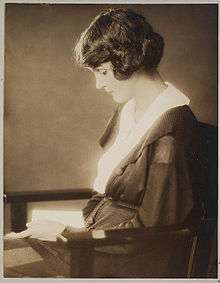Dulcie Deamer
| Dulcie Deamer | |
|---|---|
 Portrait photo (1920s) | |
| Born |
Mary Elizabeth Kathleen Dulcie Deamer 13 December 1890 Christchurch, New Zealand |
| Died |
16 August 1972 (aged 81) Randwick, New South Wales, Australia |
| Nationality | Australian |
| Occupation | novelist, poet, journalist and actor |
| Known for | founder of the Fellowship of Australian Writers |
Mary Elizabeth Kathleen Dulcie Deamer (13 December 1890 – 16 August 1972) was an Australian novelist, poet, journalist and actor. She was a founder and a committee member of the Fellowship of Australian Writers.
Life
Deamer was born in Christchurch, New Zealand, daughter of George Edwin Deamer, a physician from Lincolnshire, and his New Zealand-born wife, Mable Reader. She was taught at home by her mother, who had been a governess[1] and married Albert Goldie, a theatrical agent, in Perth on 27 August 1908.[2]
Career

In the 1920-30s Dulcie Deamer was a poet, playwright and author in Sydney, where she was Australia's first female boxing reporter.[3]
Deamer was known as the "Queen of Bohemia" due to her involvement with Norman Lindsay's literary and artistic circle, the Bohemian world of Kings Cross, Sydney, and vaudeville.[4] During the inter-war years, many balls were held in Sydney, including those known as the "Artists' Balls" which had been held as far back as the 1880s. Dulcie Deamer attended every Artists' Ball for 30 years.[5] The leopard-skin costume with dog-tooth necklace that she wore to the 1923 Artists' Ball in Sydney "has come to symbolise the joie de vivre of the decade, despite Deamer's own protest regarding its relevance."[5][6]
The balls regularly made the newspapers and behaviour at the 1924 Ball, which Dulcie referred to as "The Night of the Great Scandal", resulted in the introduction of restrictions on alcohol and a greater police presence for subsequent events.[5]
Hooligans took control of Sydney Town Hall basement during the progress of the Artists' Ball on Friday night, and had to be ejected by the police. Prior to this two persons had to be arrested for drunkenness, and two as being suspected persons. Several free fights developed, and many persons were injured when beer bottles were thrown. The Inspector-General of Police agrees that there were many instances of unseemly conduct. He attributes them to unlimited supplies of liquor and lack of efficient control.
Queanbeyan Age and Queanbeyan Observer
2 September 1924[7]
Poems written by Deamer appeared in the souvenir program of the 1924 ball along with those of Kenneth Slessor.[5]
Literary works
Novels
- The Suttee of Safa (New York, 1913)
- Revelation (London, 1921)
- The Street of the Gazelle (London, 1922)
- The Devil's Saint (London, 1924)
- Holiday (1940)
Plays
- That by which Men Live (1936)
- Victory (1938)
Poetry
- Messalina (1932)
- The Silver Branch (1948)
Death
Deamer died at the Little Sisters of the Poor, Randwick, New South Wales, aged 81. Her daughter, the theologian Rosemary Goldie, died there as well, three decades later.
References
- ↑ Rutledge, Martha (1981). "Deamer, Mary Elizabeth Kathleen Dulcie (1890–1972)". Australian Dictionary of Biography. Canberra: Australian National University.
- ↑ "West Australia". The Barrier Miner (Broken Hill, NSW: National Library of Australia). 28 August 1908. p. 4. Retrieved 5 July 2013.
- ↑ Deamer, Dulcie; Kirkpatrick, Peter John; Deamer, Dulcie, 1890-1972. Golden decade (1998), The queen of Bohemia : the autobiography of Dulcie Deamer : being "The golden decade", University of Queensland Press, ISBN 978-0-7022-2726-4
- ↑ Adelaide (1988) p. 48
- 1 2 3 4 Beck, Deborah (Jul–Aug 2013). "Scandalous Nights". Inside History (Ben Mercer) (17): 56–57. ISSN 1838-5044.
- ↑ "Dulcie Deamer.(Summer Herald)", The Sydney Morning Herald, 2011-12-30: 6, ISSN 0312-6315
- ↑ "Medical Appointments". Queanbeyan Age and Queanbeyan Observer (NSW: National Library of Australia). 2 September 1924. p. 2. Retrieved 9 July 2013.
Sources
- Adelaide, Debra (1988). Australian Women Writers: A Bibliographic Guide. London, Sydney: Pandora. ISBN 9780863581496.
External links
| Wikimedia Commons has media related to Dulcie Deamer. |
- Dulcie Deamer's Australian theatre credits at AusStage
- "Artists' Balls". Dictionary of Sydney. Dictionary of Sydney Trust. Retrieved 5 October 2015. [CC-By-SA]
Authority control